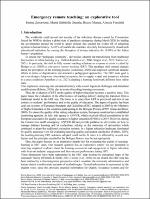Chapter Emergency remote teaching: an explorative tool
Author(s)
Forciniti, Alessia
Zavarrone, Emma
Grassia, Maria Gabriella
Mazza, Rocco
Language
EnglishAbstract
The worldwide rapid spread and severity of the infectious disease caused by Coronavirus forced the WHO to declare a global state of pandemic emergency during March 2020, by leading the governments around the world to adopt policies that created the widest rift of education systems in human history. Italy have temporarily closed each educational institution, by causing the disruption of tertiary education for 16.89% of the Italian learner’s population. To ensure the “pedagogic continuity”, universities adopted the transitioning from traditional face-to-face to online learning. This paradigm shift to fully remote teaching solutions represents the so-called emergency remote teaching (ERT) in contrast to the traditional teaching inspired by Bologna process principles such as teaching quality and student satisfaction. In a landscape of emerging difficulties connected to ERT contexts, the quality assurance of higher education recalled by the Bologna Process may be not appropriate. We propose an evaluation model for the quality and ERT success across two dimensions used as proxy variables: students’ engagement (SE) and success performance (SP). Within the faculties, we analysed the performance and hence the knowledge, skills and/or attitudes acquired by learners, within the students, the focus was the engagement as interest, motivation and involvement. Under this perspective our research question has an explorative nature: we are interested in detecting empirical evidence about the learning assessment and engagement in higher education with focus on students’ engagement and their success performance during ERT. The investigation carried out on Iulm University’s student population (N=775). We integrated textual data related to the students evaluation of ERT and their career data such as credits, marks before and post disease. The results show the relations between the two dimensions taken into account, with a multidimensional approach we created a factorial plan useful to create an agile tool of analysis in the ERT context.
Keywords
Emergency Remote Teaching; Data integration; Text analyticsDOI
10.36253/978-88-5518-461-8.12ISBN
9788855184618, 9788855184618Publisher
Firenze University PressPublisher website
https://www.fupress.com/Publication date and place
Florence, 2021Series
Proceedings e report, 132Classification
Social research and statistics


 Download
Download Web Shop
Web Shop